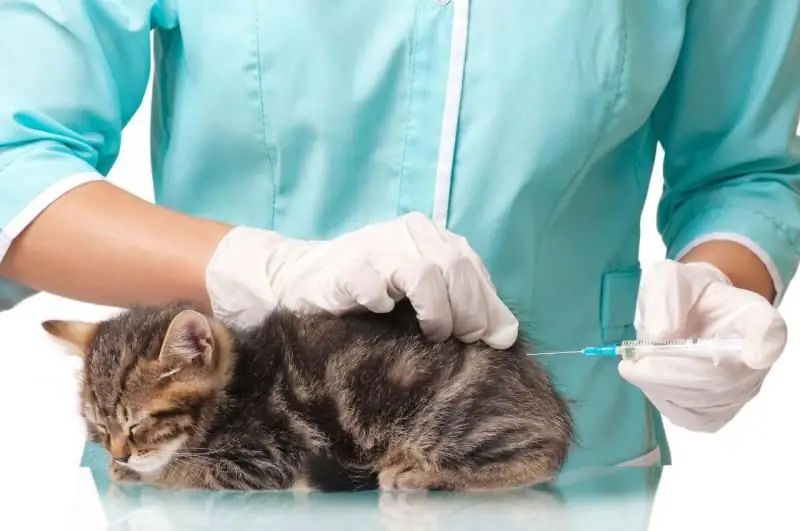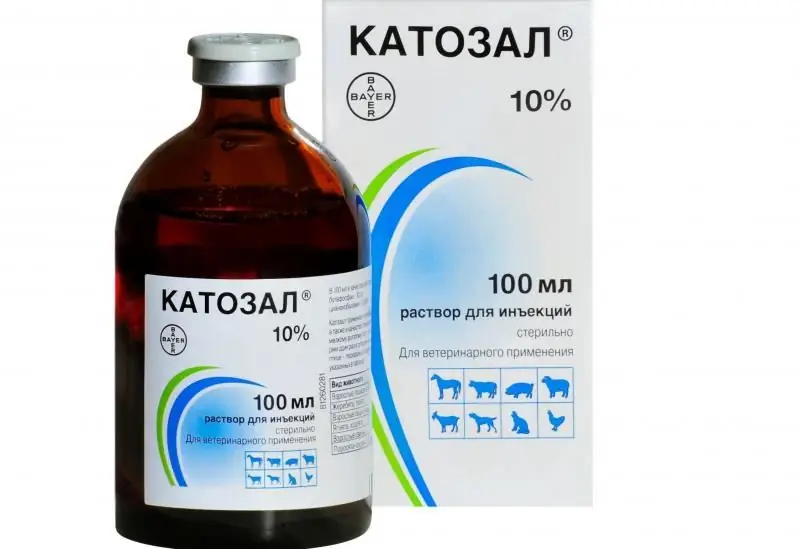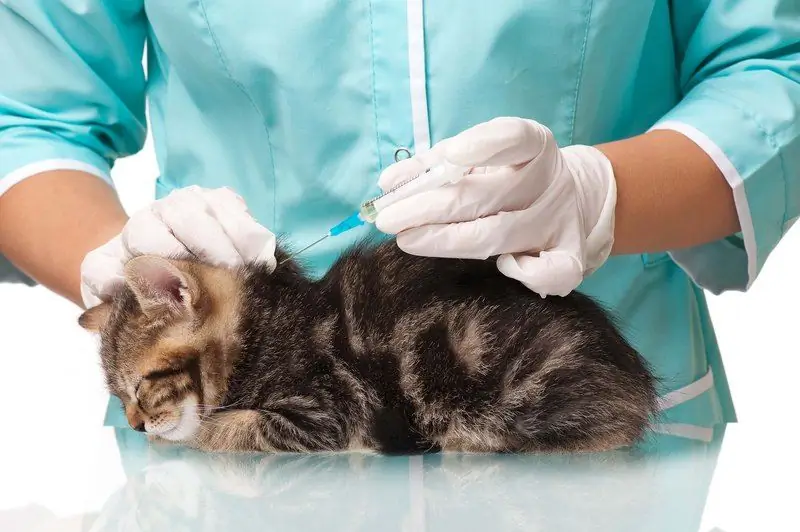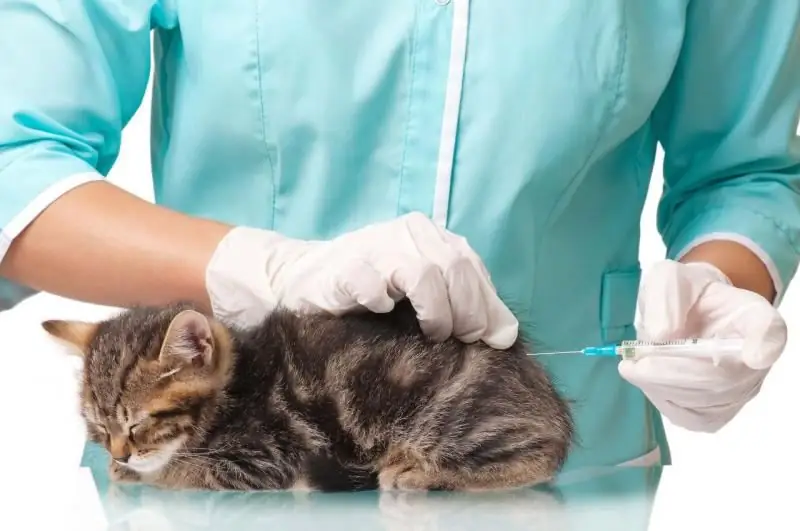
Table of contents:
- Ipakitine for renal failure:
- Composition and release form of the drug Ipakitine
- The mechanism of action of the drug
- Indications for use of Ipakitine in cats
- How to use the product correctly
- Contraindications and side effects of the drug
- Participation in drug-drug interactions
- Comparison with analogues
- Cat owners reviews
- Author Bailey Albertson albertson@usefultipsdiy.com.
- Public 2024-01-17 22:26.
- Last modified 2025-01-23 12:41.
Ipakitine for renal failure:

An increase in the level of the hormone of the parathyroid glands - parathyroid hormone - is considered the main and severe complication of chronic renal failure, which begins its development early, even in the absence of clinical signs of the disease, and triggers an increase in the level of phosphorus in the blood. One of the drugs that can effectively reduce the phosphorus content and prolong the life of a pet, while maintaining its quality, is Ipakitine.
Content
- 1 Composition and release form of the drug Ipakitine
- 2 The mechanism of action of the drug
-
3 Indications for use of Ipakitine in cats
- 3.1 Effects on the urinary system
- 3.2 Video: chronic renal failure, veterinarian advice
-
4 How to use the product correctly
4.1 Features of use in kittens and pregnant cats
- 5 Contraindications and side effects of the drug
- 6 Participation in drug-drug interactions
-
7 Comparison with analogues
-
7.1 Table: Overview of Phosphate Binders Used in Veterinary Medicine
7.1.1 Photo Gallery: Other Phosphate Binders
-
- 8 Reviews of cat owners
Composition and release form of the drug Ipakitine
The Ipakitine remedy is developed and produced by the French company Vetokinol S. A. (Vetoquinol, SA). Ipakitine is produced in the form of a cream-colored powder mass, packaged in plastic jars of 60 and 180 grams. The plastic lid serves both for hermetic sealing of the container with the preparation and for checking the first opening of the package. Each package of Ipakitine is completed with a dosing spoon containing 1 gram of powder, as well as an annotation for the use of the product. The medicine does not dissolve in water.
The composition of Ipakitine reflects the natural tendency characteristic of the French and is represented by ingredients of natural origin. 100 g of the product contains:
- chitosan, which is a polymeric substance of natural origin, isolated from chitin, which is part of the shells of crustaceans - 8 g;
- calcium carbonate - 10 g;
- lactose - up to 100 g.

Ipakitine is available in cans of 180 and 60 grams
The mechanism of action of the drug
According to the mechanism of action, Ipakitine is a combined drug. The impact is carried out with the involvement of both chitosan and calcium carbonate.
A large number of amino groups in the composition of huge polymer molecules of chitosan create hydrogen bonds that reliably hold trapped heavy metals, radionuclides, and a variety of organic toxins. The main benefit of chitosan in chronic kidney failure is the uptake and irreversible binding of indole and urea. Indole is formed from the essential amino acid tryptophan with its participation in the metabolism of the intestinal flora. When passing through the liver, indole is converted into indoxyl sulfate, which, when kept in normal amounts, performs an antioxidant function, but in the absence of excretion by the kidneys, it accumulates and causes harm:
- has a direct damaging effect on the renal tissue, causing the processes of inflammation and fibrosis - the proliferation of connective tissue, accelerating the death of nephrons and causing the progression of renal failure;
- participates in the formation of vascular lesions, causing damage to the endothelium - the inner lining of the vessel, and also prevents the restoration of both the endothelium and the smooth muscle cells of the vascular wall. This leads to calcification of the vessel wall, which becomes stiff, rigid and unable to respond to regulatory signals by changing the vessel lumen, which is necessary for a full blood supply to the tissues. A damaged vascular wall causes a blood clot to form;
- in experiments on rats caused reversible fibrosis of the lungs, leading to thickening of the walls of the alveoli and preventing the transport of water molecules.
This is not a complete list of the "atrocities" of this molecule; the study of the toxic effects of indoxyl sulfate continues. But the data already available to scientists was enough to rank this compound as a risk factor for mortality in chronic renal failure. Moreover, since indoxyl sulfate binds to protein, it is difficult to remove it even during hemodialysis, and the role of intestinal sorbents in reducing the content of this substance, including chitosan, looks invaluable.
Additional benefits of using chitosan include:
- binding and excretion of bile acid molecules from the lumen of the digestive system, reducing the level of cholesterol formed from them;
- an increase in hemoglobin due to an improvement in the condition of the kidneys and an increase in the production of erythropoietin;
- is a ballast substance, stimulates intestinal peristalsis, prevents the development of constipation.
Calcium carbonate, which is part of Ipakitine, performs the following functions:
- produces binding of phosphorus ions, participating in the normalization of phosphorus-calcium metabolism;
- helps to reduce systemic acidosis (shift of the acid-base balance to the acidic side) due to the alkalizing effect.
A small part of chitosan is metabolized, while the bulk of it is excreted by the intestines along with absorbed toxins. Part of calcium ions is secreted by the intestines, and part - by the kidneys.
Ipakitine is classified as a low-hazard compound in terms of the degree of effect on the body.

The lid of the package with Ipakitine ensures tightness and control of the first opening
Indications for use of Ipakitine in cats
Ipakitine is used in the complex treatment of chronic renal failure in cats.
Effects on the urinary system
Ipakitine is a phosphate binder, an agent involved in the binding of phosphorus from food. With renal failure, the level of phosphorus in the blood increases due to the delay in its excretion by the kidneys, since this is the only way of excreting phosphorus. There is a natural balance between phosphorus and calcium, and an increase in phosphorus levels leads to a decrease in calcium levels. The parathyroid glands react to a low calcium content, releasing parathyroid hormone, which promotes the rapid flushing of a large amount of calcium ions from the bone tissue of the skeleton, while excess calcium in the form of crystals of its salts falls into the tissues, causing dystrophic changes in them - calcification. Other substances also take part in the regulation of phosphorus-calcium metabolism, but it was found that it is an increase in the level of phosphorus, independently of other factors, that increases the formation of parathyroid hormone, which becomes uncontrollable with the development of the disease. All tissues are subject to calcification, most often:
- the cardiovascular system - both the heart itself and the vessels, especially the aorta, are affected; vascular calcification causes the development of a persistent increase in blood pressure, resistant to the effects of drug therapy, and also predisposes to the development of thrombosis. The risk of heart attacks, strokes, thromboembolism increases - when a detached thrombus blocks the lumen of the vessel and stops blood flow; all these conditions pose a direct threat to the life of the pet;
- soft tissues in the area of the joints - while the mobility in the joints decreases, and the movements become painful;
- skin - calcium salts cause very severe itching.
The washing out of calcium from the bones leads to a decrease in their strength, over time this leads to deformation of the bones, the heterogeneity of their structure and can even cause pathological fractures.
Modern researchers give parathyroid hormone a leading role in the formation of uremic intoxication, since in addition to washing out calcium salts from bones and depositing them in tissues, increased secretion of parathyroid hormone causes a number of negative phenomena that complicate the course of renal failure
-
the cardiovascular system:
- increased blood pressure;
- development of uremic or effusion pericarditis;
- chronic heart failure;
-
eyes:
- increased intraocular pressure;
- small retinal infarctions;
- retinal disinsertion;
- endocrine system: an increase in insulin resistance and an increase in the rate of breakdown of fats in fat cells lead to weight loss to the point of exhaustion;
- hematopoiesis: the development of anemia, and pancytopenia is also possible - inhibition of all hematopoietic sprouts due to the displacement of the bone marrow by connective tissue under the action of parathyroid hormone;
-
nervous system:
- neuropathies;
- paresis and paralysis;
- digestive system: uremic gastroenteritis.
By binding the phosphorus supplied with food, Ipakitine prevents a decrease in the content of serum calcium, and therefore reduces the activity of the parathyroid hormone of the parathyroid glands. Since the calcium that has not reacted with food phosphates, which is part of Ipakitine, is absorbed from the intestinal lumen, it also increases the level of serum calcium; on the other hand, the level of calcium in chronic renal failure must always be monitored in the laboratory, since its excess will inevitably cause tissue calcification.
The chitosan in Ipakitin reduces urea and indoxyl sulfate, which improves kidney function and causes serum creatinine to decrease
Video: chronic renal failure, veterinarian advice
How to use the product correctly
Ipakitine is given when feeding at the rate of 1 g of the drug per 5 kg of the pet's weight twice a day. The course of treatment lasts from 3 to 6 months. Considering that the drug is a powder, it is most convenient to feed it with wet food, but if the cat eats dry food, then part of it is soaked in water, added to Ipakitina and given to the pet. In the annotation to the drug, the manufacturer warns about the inadmissibility of missing the drug, as this will result in a decrease in the effect of the therapy. If a pass does occur, treatment must be resumed as soon as possible without changing the dose, as well as the regimen.
Features of use in kittens and pregnant cats
Since the components included in Ipakitine are safe, its use is possible both in pregnant and lactating cats, and in kittens without special restrictions.

Ipakitine can be used in pregnant and lactating cats as well as kittens
Contraindications and side effects of the drug
A contraindication to the treatment of Ipakitine is the presence of individual hypersensitivity to its constituent components. With the development of allergies, the drug is immediately stopped and symptomatic therapy is performed with desensitizing agents (Tavegil, Suprastin) or corticosteroids for severe manifestations, for example, with shortness of breath.
Participation in drug-drug interactions
There are no data on the entry of the components of Ipakitine into interaction with other drugs, so the agent is convenient to use as part of a complex multicomponent therapy regimen.
Comparison with analogues
There are no direct analogs to Ipakitin with the same composition. It makes sense to consider Ipakitine as part of a group of phosphate binders.
Table: overview of phosphate binders used in veterinary medicine
| Drug name | Structure | Features of the action | Price, rub |
| Almagel Neo | Algedrate, magnesium hydroxide, simethicone | Effectively controls the level of phosphorus in the blood; disadvantages include the possibility of aluminum poisoning, which manifests itself in softening of the bones, anemia, encephalopathy and neuropathies; incompatible with oral administration of potassium preparations, therefore potassium, when used together, potassium is injected | from 189 |
| Renagel | Sevelamer | Effectively controls the level of phosphorus in the blood; the disadvantages include the risk of developing acidosis, high price, very large capsules that are inconvenient to give to the cat | from 8000 |
| Renal | Chitosan, Calcium Carbonate, Potassium Citrate, Maltodextrin | Efficiency and ease of use; an additional source of calcium, helps to reduce the level of parathyroid hormone, an additional source of potassium. Disadvantages: if used incorrectly, there is a risk of developing hypercalcemia; since it binds iron supplied with food in the intestine, it requires parenteral administration of its preparations; should not be used in the late stage of renal failure, since serum potassium levels increase with it. | 1120 for 50 g |
| Ipakitin | Chitosan, calcium carbonate | Efficiency and ease of use; an additional source of calcium, helps to reduce the level of parathyroid hormone. Disadvantages: if used incorrectly, there is a risk of developing hypercalcemia; since it binds iron supplied with food in the intestine, it requires parenteral administration of its preparations. | 2050 for 180 g; 1167 for 60 g |
Photo gallery: other phosphate binders
-

Renal packaging - Renal also contains chitosan and calcium carbonate; it contains potassium, which limits its use in the late stage of renal failure, since the level of potassium in the blood increases with it
-

Almagel Neo packaging - It is a very effective remedy and reduces phosphorus well, but it can cause aluminum intoxication, therefore, it is used in courses of 3 weeks
-

Renagel forms - Effective, calcium-free, unreasonably expensive
Cat owners reviews
Ipakitine is a phosphate binder, a drug that binds phosphorus and prevents it from rising. Ipakitine is characterized by high efficiency, safety, ease of use and affordable price. Treatment with Ipakitina should be started as early as possible, it is carried out in courses and is lifelong. Ipaketine helps to prolong the life of a sick pet and preserve its quality. The tool is used only as part of complex therapy. Since it contains calcium, both excess and deficiency of which are dangerous, it requires monitoring of calcium in the blood and strict adherence to the dosage regimen. Since it binds iron supplied with food, it requires parenteral administration of its preparations. It can be used at all stages of renal failure, including the latter, since it does not contain potassium.
Recommended:
Frontline For Cats: Instructions For Use, Spray And Drops, Indications And Contraindications, Analogs, Reviews, Price

How and from what Front Line protects the cat: mechanism of action, scheme of application. Contraindications, side effects. Prices and analogues. Reviews of owners and veterinarians
Fosprenil For Cats And Cats: Instructions For Use In Kittens And Adult Animals, Contraindications And Side Effects, Price, Reviews

What is Fosprenil used for in cats: composition and release form of Fosprenil; indications for use; contraindications and side effects
Catosal For Cats: Instructions For Use In Veterinary Medicine, Indications And Contraindications, Dosage, Reviews And Analogues

What is the drug Catosal used for in cats? What effect does the product have? Are there any contraindications and side effects? Reviews about the drug
Nobivak For Cats And Cats: Instructions, Vaccine Price, Reviews On The Use In Kittens And Adult Animals, Analogues

Types of Nobivac vaccines for cats: Trikat Trio, Rabies, Forkat, Bb. Vaccination schedule. Method of administration. Contraindications. Possible consequences. Analogs
Imunofan For Cats: Instructions For Use, Prevention And Treatment With The Drug, Contraindications, Price, Reviews, Analogues

What is Imunofan used for in cats: composition, indications for use, treatment with Imunofan for lichen, tumors, rhinotracheitis, contraindications and side effects
